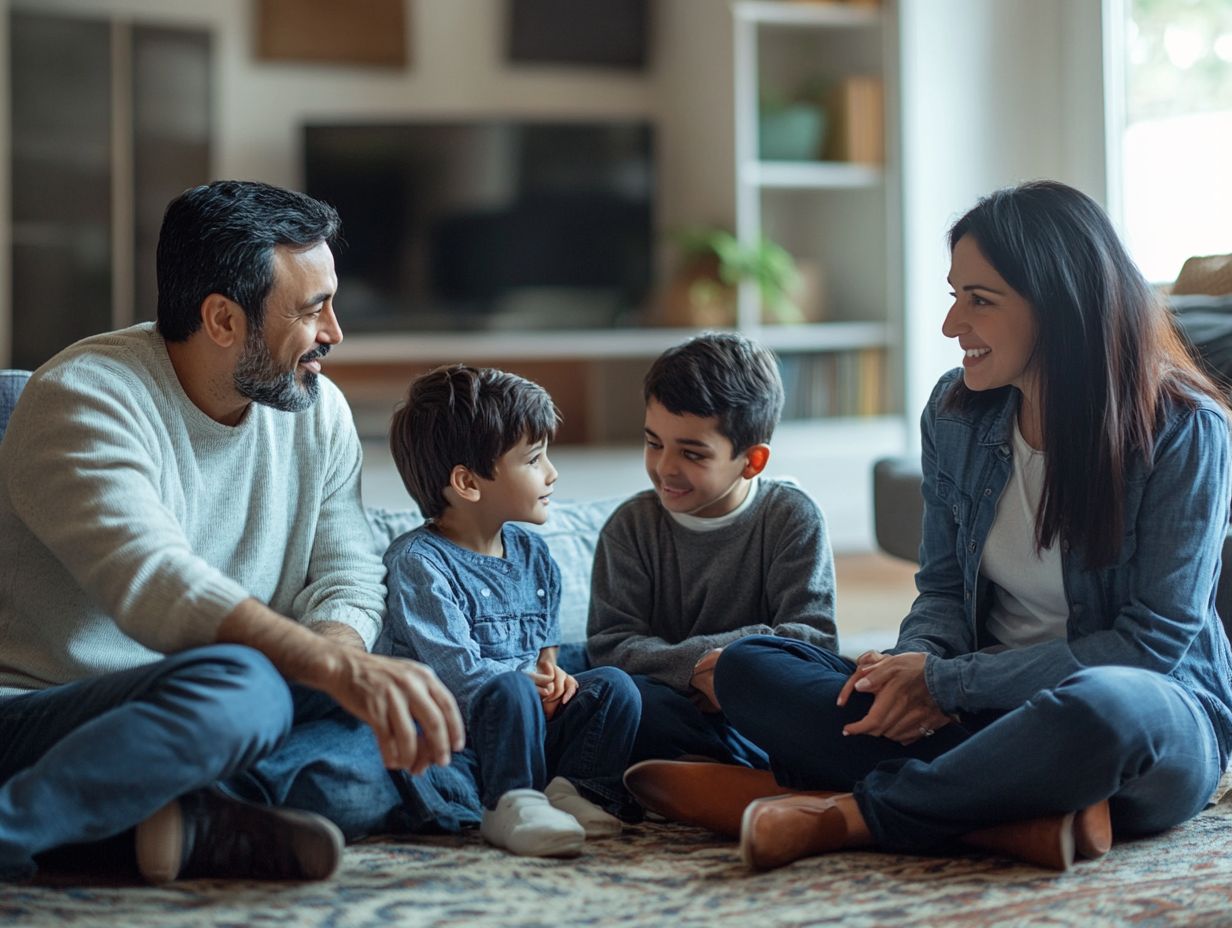Mindful Communication: Tips for Parents
Contents
- Mindful Communication for Parents
- Key Takeaways:
- 1. Listen with Empathy and Understanding
- 2. Avoid Interrupting or Judging
- 3. Use ‘I’ Statements
- 4. Practice Active Listening
- 5. Be Mindful of Nonverbal Cues
- 6. Take a Break When Emotions Are High
- 7. Be Open to Compromise
- 8. Use Positive Language
- 9. Be Mindful of Your Tone
- 10. Show Appreciation and Gratitude
- What Is Mindful Communication and Why Is It Important for Parents?
- Frequently Asked Questions
- What is mindful communication and why is it important for parents?
- How can I practice mindful communication with my child?
- What are some benefits of mindful communication for parents and their children?
- How can I stay mindful in the midst of a heated conversation with my child?
- What are some common communication mistakes parents should avoid?
- How can I encourage my child to practice mindful communication?
- Additional Resources
Mindful Communication for Parents
Unlock the secrets to a stronger parent-child relationship today with mindful communication strategies!
Effective communication is the bedrock of strong parent-child relationships. Listening with empathy and using positive language fosters understanding and connection.
This article highlights common communication pitfalls and shows how mindful communication benefits both parents and children. You ll discover that making small changes can lead to significant improvements in your family dynamics, enriching the bond you share.
Key Takeaways:

- Listen to your child with empathy and understanding to effectively communicate and build a strong relationship.
- Avoid interrupting or judging your child’s thoughts or feelings; instead, listen and validate their emotions.
- Use “I” statements to express your own emotions and avoid blaming or accusing your child.
1. Listen with Empathy and Understanding
Listening with empathy and understanding is at the heart of mindful communication, a vital skill for anyone, especially parents, as they navigate managing emotions and build healthier relationships with their children.
By prioritizing compassion in your interactions, you can cultivate an environment where emotional regulation flourishes, leading to more effective communication patterns.
This approach is essential for nurturing a positive parent-child relationship, echoing the insights of experts like Nancy and underscoring the significance of active listening, which means fully focusing on the speaker, understanding their message, and responding thoughtfully.
Mindful communication not only aids in recognizing and managing emotional triggers but also deepens the connection between you and your children through understanding and support. As Nancy highlights, creating a safe space for expression is crucial; you can achieve this through techniques such as reflective listening and open-ended questions that encourage your children to articulate their feelings and thoughts.
Modeling emotional intelligence by sharing your own feelings appropriately also teaches your children the value of vulnerability and openness. Consistently practicing these skills paves the way for deeper conversations, ultimately enhancing empathy and strengthening the family bond.
2. Avoid Interrupting or Judging
In the realm of mindful communication, steering clear of interruptions or judgments is essential for cultivating open dialogue and minimizing defensive reactions during conversations.
When you practice active listening and grant others the space to fully articulate their thoughts without unnecessary disruptions, you foster an atmosphere of trust and respect. This change improves dialogue quality and reduces emotional triggers that lead to conflict.
Incorporating techniques such as pausing before you respond, summarizing the other person’s points for clarity, and posing open-ended questions can significantly enhance the empathy of your exchanges. By embracing these strategies, you can transform your communication patterns, paving the way for deeper understanding and connection with those around you.
3. Use ‘I’ Statements
Utilizing ‘I’ statements is a fundamental aspect of mindful communication, enabling you to articulate your feelings and thoughts without coming across as accusatory. This approach not only fosters emotional regulation but also paves the way for open dialogue.
By incorporating ‘I’ statements, you can guide your children in understanding and embracing their emotions in a non-threatening way. Instead of saying, “You never listen to me!” which is likely to put them on the defensive you might opt for a rephrasing like, “I feel unheard when I m trying to share something important.” This simple adjustment reduces the likelihood of a defensive reaction and promotes empathetic listening.
Embracing ‘I’ statements cultivates an environment where feelings are acknowledged and validated, allowing for deeper connections to flourish. This practice significantly strengthens your bond with your child, helping both of you navigate emotions together.
4. Practice Active Listening
Practicing active listening is essential for mindful communication, as it deepens connections and enhances understanding in your relationships by acknowledging emotional triggers and demonstrating genuine compassion.
By employing techniques such as reflecting, paraphrasing, and asking open-ended questions, you can create a safe space for meaningful dialogue. Reflecting involves mirroring feelings back to the speaker, which not only validates their emotions but also clarifies any potential misunderstandings. When you paraphrase, you articulate your understanding of what has been said, reinforcing the message and minimizing confusion. Open-ended questions invite others to explore their thoughts and feelings more deeply, paving the way for richer conversations.
In the context of mindful parenting, these techniques can greatly reduce misunderstandings and foster a nurturing atmosphere, ultimately leading to stronger and more resilient parent-child relationships.
5. Be Mindful of Nonverbal Cues

Being mindful of nonverbal cues is crucial for you in achieving meaningful communication. These cues significantly shape how messages are interpreted and can often unveil deeper emotional triggers.
By grasping the subtleties of body language, facial expressions, and tone of voice, you can dramatically elevate the quality of your interactions with your children. For instance, employing a gentle tone alongside an open posture can create a safe haven for your children to share their feelings, nurturing an atmosphere of trust and open dialogue.
You can also enhance your parenting by incorporating mindfulness techniques such as focused breathing or reflective listening. These practices help you stay present and attentive, allowing you to not only monitor your own nonverbal signals but also tune in to your child’s emotional state. For a more comprehensive approach, consider exploring mindful communication: a parent’s guide. This heightened awareness paves the way for deeper connections and more empathetic responses, enriching your relationship with them.
6. Take a Break When Emotions Are High
In the art of mindful communication, knowing when to hit pause during emotionally charged moments is essential for your emotional regulation and for fostering constructive dialogue.
Taking a break allows you to step back, evaluate your feelings, and contemplate your responses with greater clarity. This practice is particularly vital for parents, as it sets a positive example for children. By recognizing your emotional state be it frustration, sadness, or anger you can cultivate a space for self-discovery that promotes healthier interactions.
Employing simple strategies like taking deep breaths, counting to ten, or stepping outside for a moment can be incredibly effective in regaining your composure. Additionally, journaling your feelings or confiding in a trusted friend can bring you valuable clarity. This self-reflection not only alleviates immediate tension but also enhances your long-term communication skills within the family.
7. Be Open to Compromise
Being open to compromise is essential for mindful communication, as it cultivates collaboration and nurtures healthy relationships by balancing differing perspectives. This practice of yielding and understanding enables you to navigate conflicts with grace, laying the groundwork for more constructive conversations.
For instance, when you actively listen to your children’s viewpoints during disagreements, you not only model positive conflict resolution but also foster an atmosphere of trust. This approach encourages your children to express their feelings freely, knowing their opinions hold value. As flexibility becomes the norm in your relationship, it strengthens your bond, leading to greater respect and empathy.
Ultimately, embracing compromise can transform potential conflicts into opportunities for deeper understanding and connection.
8. Use Positive Language
Utilizing positive language in mindful communication can significantly elevate your interactions by minimizing emotional triggers and cultivating a supportive atmosphere in your relationships.
When you consciously choose your words, you not only uplift your own spirits but also create a welcoming space for others, making them feel valued and understood. For example, instead of saying, “You never listen to me,” you might say, “I really appreciate when you share your thoughts during our conversations.” This small shift can strengthen your connection and encourage a more open dialogue.
Reframing a statement like “I don t like how you did that” to “I think there might be a more effective way to approach this” softens the critique and invites collaboration. These practices enhance your emotional well-being by promoting empathy and respect in your communication.
9. Be Mindful of Your Tone
Being mindful of your tone is an essential component of effective communication and open communication. The way you express yourself can significantly impact how your messages are received and evoke strong emotional responses.
A warm and inviting tone fosters trust and openness, while a harsh or dismissive tone may inadvertently breed defensiveness or resentment. This is particularly vital for parents, as children are impressionable and highly attuned to emotional cues in their surroundings.
To cultivate a more positive atmosphere, practice active listening really paying attention when someone speaks demonstrate empathy, and adjust your voice to convey gentleness or enthusiasm based on the context. Techniques such as using open-ended questions and validating feelings can facilitate a nurturing dialogue that encourages children to express themselves freely. Such mindfulness techniques are vital in mindful parenting.
10. Show Appreciation and Gratitude

Expressing appreciation and gratitude is a transformative practice in mindful communication, enhancing positive relationships and fostering compassion among individuals.
When you consciously acknowledge your child’s efforts no matter how big or small you cultivate an environment where open dialogue can thrive. This simple act can boost your child’s self-esteem and strengthen your bond like never before!
Employing straightforward strategies can help make gratitude a daily habit. For instance, consider setting aside a few minutes each day to share what you re thankful for, or seize specific moments, like after a successful homework session, to commend your child s hard work. Such awareness insight can enhance mindful parenting.
By consistently embracing this approach, you nurture a culture of appreciation, encouraging your children to recognize and value the contributions of others as well. Start today by sharing one thing you’re thankful for with your child!
What Is Mindful Communication and Why Is It Important for Parents?
Mindful communication is a critical component of mindful parenting.
Mindful communication is all about engaging in dialogue with a deliberate focus on emotions and reactions. This practice is especially crucial for parents who wish to nurture managing feelings and foster healthy relationships with their children, particularly those who have ADHD or autism. Incorporating mindfulness meditation can also be beneficial for parents seeking effective strategies.
By embracing this approach, you can navigate the complexities of your child’s emotional landscape with a sense of empathy and patience. When you concentrate on the present moment and practice active listening, you can alleviate feelings of stress and anxiety that often accompany challenging situations. This is where mindfulness techniques come into play.
Mindful communication not only clarifies your thoughts but also enriches your emotional intelligence. This enables you to model and teach your children effective emotional responses. In doing so, you cultivate a mutual understanding, strengthen the bond between you and your child, and create a safer environment that promotes resilience and well-being within your family dynamic. Experts like Pema Ch dr n and Elisha Goldstein have extensively discussed these benefits.
How Can Mindful Communication Improve Relationships with Children?
Mindful parenting can significantly enhance the parent-child relationship.
Mindful communication can truly elevate your relationship with your children by encouraging emotional regulation and cultivating an environment where emotional triggers are both recognized and addressed.
By actively listening to your child’s feelings and thoughts without passing judgment, you create a sanctuary of safety and trust. For example, when your child expresses frustration with a school project, rather than jumping straight to solutions, consider saying, “I can see you’re feeling really upset about this. What do you think we should do?” This approach not only validates your child’s emotions but also enables them to explore their own solutions, enhancing their emotional intelligence. Parents like Nancy and Robert have found this technique useful in nurturing their parent-child relationship.
As a result, your child becomes better equipped to navigate their feelings, while the bond you share grows stronger through mutual understanding and respect.
What Are the Common Communication Mistakes Parents Make?
Common mistakes include not being aware of communication patterns and defensive reactions.
Common communication mistakes made by parents often trigger defensive reactions and misunderstandings, underscoring the importance of mindful communication techniques for parents to effectively navigate emotional triggers.
When you resort to criticism, dismissiveness, or vague statements, you may inadvertently widen the gap in understanding with your children. This can create increased tension and resentment within the family, ultimately impacting everyone s emotional well-being. Authors like Susan Gillis Chapman and publications from Shambhala Publications often address these communication patterns.
The consequences of these communication breakdowns can be significant, leading to a loss of trust and a decline in open dialogue. To remedy these issues, consider adopting strategies like active listening fully concentrating on your children s thoughts and feelings without interruption.
By utilizing “I” statements, you can convey your feelings without casting blame, thereby nurturing an environment that promotes healthier interactions and emotional growth. This aligns with the teachings of experts like Susan Gillis Chapman and Mark Bertin.
How Can Parents Incorporate Mindful Communication into Daily Interactions?
Simple yet practical skills can make a big difference.
You can seamlessly incorporate mindful communication into your daily interactions by embracing practical skills that enhance emotional regulation and foster meaningful connections with your children. Consider exploring 10 practical mindfulness tips for parents to further enrich your approach.
This approach not only minimizes misunderstandings but also creates a nurturing environment where your kids feel genuinely heard and valued. Simple strategies can include dedicating specific times each day for focused conversations perhaps during family meals or as part of bedtime routines allowing you to engage actively with your children about their thoughts and feelings. Experts like Mark Bertin and Amy Saltzman recommend these practices.
Keep an eye out for teachable moments, especially when emotions run high or during daily transitions, to practice active listening and empathetic responses. By consistently weaving these mindful techniques into your family life, you can cultivate resilience and emotional intelligence, ultimately strengthening the bonds that tie you all together. This approach is also highlighted in programs and documentaries by National Geographic.
What Are the Benefits of Mindful Communication for Children?

The benefits of mindful communication for children are truly remarkable. It fosters emotional regulation, self-discovery, and the cultivation of strong, healthy relationships.
By engaging in mindful communication, children learn to recognize and articulate their feelings. This is a critical component of emotional intelligence.
This increased awareness allows them to navigate social situations with greater confidence and ease. This practice benefits children even in busy places like New York City.
As they practice active listening and empathetic dialogue, they begin to understand others’ perspectives. This nurtures compassion and tolerance.
This journey boosts their self-esteem and equips them with the skills to build connections founded on trust and respect. Experts like Elisha Goldstein and Amy Saltzman emphasize the significance of developing these skills.
Mindful communication lays the foundation for friendships and a supportive social circle. The teachings of Pema Ch dr n and insights from Shambhala Publications further reinforce these principles.
Frequently Asked Questions
What is mindful communication and why is it important for parents?
Mindful communication is the practice of being present and fully engaged in a conversation with your child, without judgment or distraction. It helps parents build stronger and more positive relationships by fostering open and honest communication.
How can I practice mindful communication with my child?
You can use a changing traffic light metaphor to teach emotional regulation. Start by actively listening to your child and giving them your undivided attention.
Avoid multitasking or being distracted by technology while talking to them. Also, be aware of your own emotions and reactions, and communicate calmly and respectfully.
What are some benefits of mindful communication for parents and their children?
Mindful communication can improve the quality of your relationship with your child. It enhances their self-esteem and emotional well-being.
It also helps parents understand their child’s perspective and build trust and mutual respect.
How can I stay mindful in the midst of a heated conversation with my child?
One helpful technique is to take deep breaths and focus on your breathing. This can help you stay calm and avoid reacting impulsively.
You can also try to put yourself in your child’s shoes to understand their perspective, and then respond with empathy and understanding.
What are some common communication mistakes parents should avoid?
Some common mistakes include not actively listening, using a harsh tone, and not considering your child’s feelings or point of view. These can lead to breakdowns in communication and strained relationships.
It’s important to be aware of these mistakes and work towards improving them.
How can I encourage my child to practice mindful communication?
Lead by example and engage in mindful communication with your child. Encourage them to express their thoughts and feelings openly and without fear of judgment.
Be patient and understanding if they struggle with it, and offer encouragement and support as they work on improving their communication skills.
Start your journey to better communication today your child will thank you!
Additional Resources
Consider exploring books and resources on mindful communication to enhance your understanding and practice.






